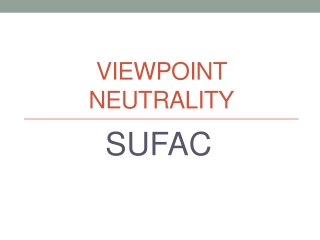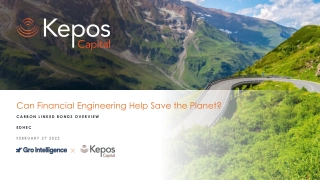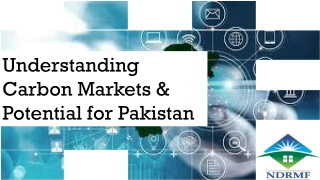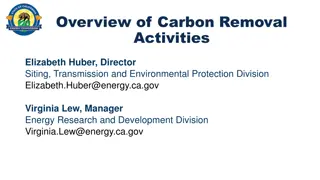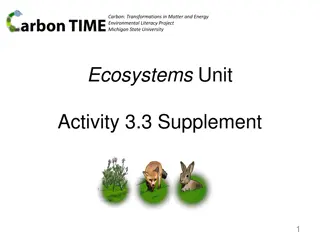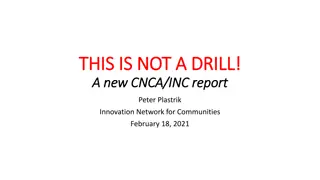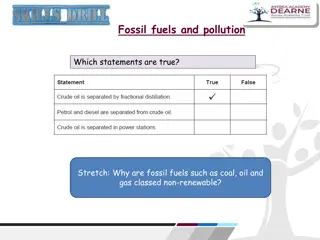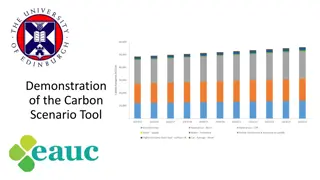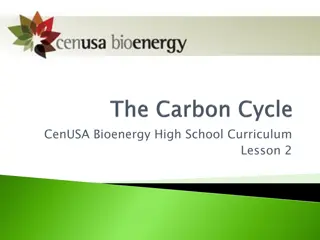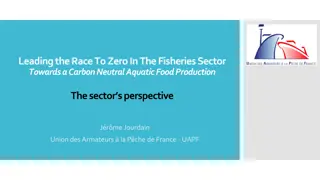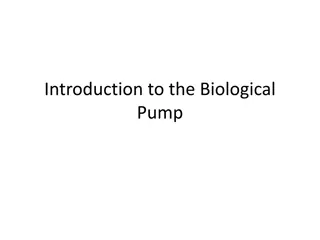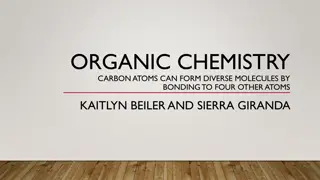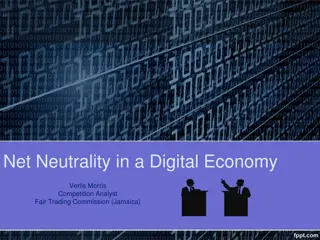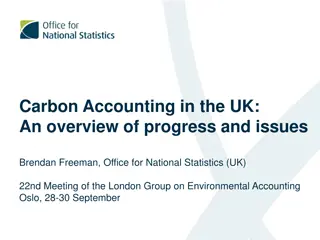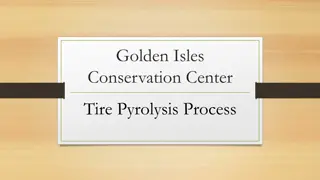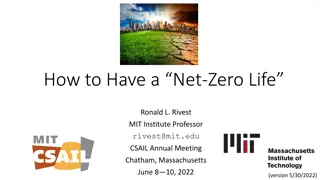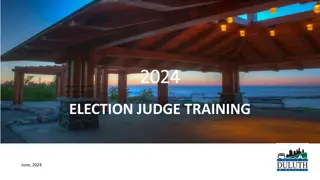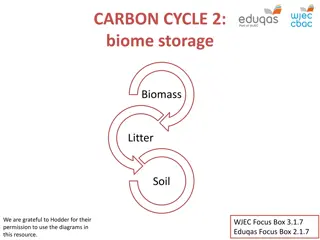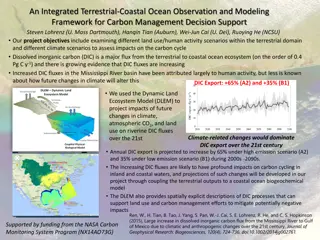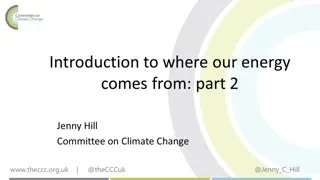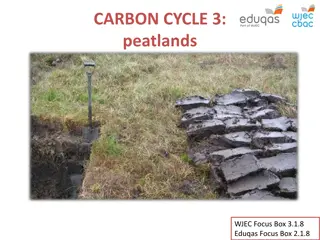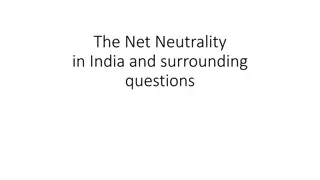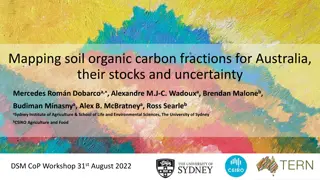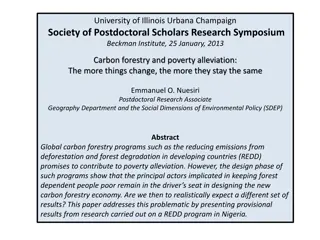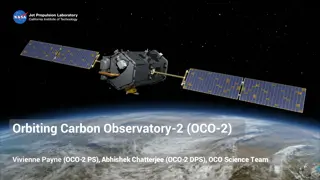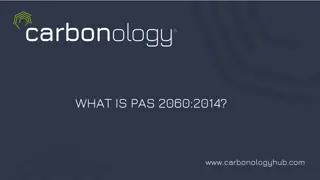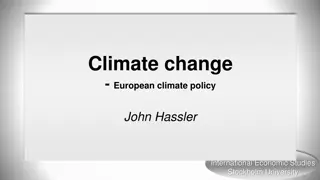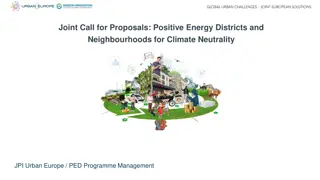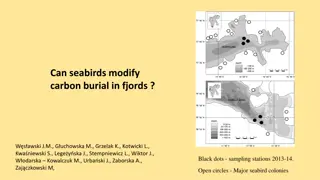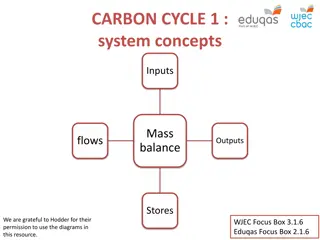Understanding Viewpoint Neutrality in Student Fee Allocations
Explore the concept of viewpoint neutrality in student fee allocations, focusing on the U.S. Supreme Court's decision in Southworth v. Board of Regents. Learn about the constitutional mandate for public institutions to remain neutral in funding decisions and the history behind the Southworth case. D
3 views • 32 slides
Can Financial Engineering Help Save the Planet?
Explore the potential of financial engineering in combating climate change through carbon-linked bonds. Dive into the concept of scaling low carbon investments, optimizing portfolio allocations, and creating credibility using financial tools. Discover how the Carbon Barometer aggregates data to trac
0 views • 13 slides
Harnessing Carbon Markets for Sustainable Development in Pakistan
Understanding the significance of carbon markets, this content delves into the interplay between economic growth and environmental sustainability, emphasizing the urgency to limit unsustainable practices. It explores mechanisms such as carbon pricing and cap-and-trade systems in the context of clima
0 views • 17 slides
Carbon Pricing Overview and EU Green Deal Agenda
The overview of carbon pricing inside the EU highlights key aspects such as the EU Green Deal, revision of the EU ETS, and the Carbon Border Adjustment Mechanism. The EU aims for carbon neutrality by 2050 with a 55% reduction target. The Fit for 55 initiative emphasizes relevance for the Energy Comm
4 views • 16 slides
Understanding Climate Neutrality and Roadmaps for Achieving it at a University
Exploring the concept of climate neutrality and the development of roadmaps to achieve it at a university, focusing on the efforts of JKU and its Energy Institute towards CO2 reduction and reaching climate neutrality by 2030. The roadmap involves stakeholder engagement, defining system boundaries, u
1 views • 19 slides
Overview of California's Carbon Removal Initiatives
California's Carbon Removal Innovation Support Program (CRISP) aims to incentivize Direct Air Capture (DAC) development in the state. The program includes research test centers, small-scale demonstrations of DAC technologies, community engagement, technical assistance, and more to enhance carbon rem
0 views • 5 slides
Ireland's Neutrality in World War II
Despite being divided into North and South, with Northern Ireland part of the UK, the Free State of Ireland remained neutral during World War II. Eamon DeValera, leader of Fianna Fail, chose neutrality, which impacted Ireland's relationship with both the Allies and the Axis powers. Learn more about
6 views • 9 slides
Understanding the Carbon Cycle: Reservoirs, Dynamics, and Importance
Earth's carbon cycle plays a crucial role in sustaining life, with carbon moving through various reservoirs and processes. This cycle involves short-term terrestrial and marine cycles, as well as long-term cycles influenced by volcanic activity and rock weathering. Understanding carbon reservoir dyn
6 views • 45 slides
Understanding Carbon-Based Nanomaterials and Their Technical Applications
Carbon-based nanomaterials, including fullerenes and carbon nanotubes, have revolutionized various industries with their unique properties. These materials, classified based on their geometrical structure, have applications in fields such as electronics, gas storage, biotechnology, and more. Fullere
0 views • 12 slides
Tracing Carbon Atoms in Ecosystems: Understanding the Organic Matter Pyramid
Explore the journey of 500 carbon atoms through producers, herbivores, and carnivores in an ecosystem. Discover how carbon atoms move through photosynthesis, cellular respiration, and biosynthesis, ultimately contributing to the organic matter pyramid. Follow the pathways of carbon atoms as they cyc
0 views • 7 slides
Communities Taking Bold Actions for Decarbonization
The report highlights how 1,750 communities globally have adopted Climate Emergency declarations to accelerate progress towards carbon neutrality. It showcases cities like Barcelona, Bristol, and Copenhagen leading the way with innovative strategies to reduce emissions and enhance decarbonization ca
0 views • 13 slides
Understanding Fossil Fuels and Pollution: A Comprehensive Overview
Fossil fuels such as coal, oil, and natural gas are non-renewable energy sources that release heat energy when burned, but also contribute to pollution when not burned completely. This leads to the release of harmful pollutants like carbon dioxide, carbon monoxide, sulfur dioxide, and carbon particu
2 views • 9 slides
Understanding the Carbon Scenario Tool for Climate Change Management
The Carbon Scenario Tool (CST) is a valuable resource developed by the University of Edinburgh and the Scottish Funding Council to manage, report, and forecast carbon emissions for university estates and operations. It enables the calculation of the impact of carbon reduction projects and the develo
2 views • 18 slides
Understanding Carbon Movement in the Environment
Explore the intricate processes of carbon movement in the biosphere, atmosphere, oceans, and geosphere. Learn how plants absorb carbon dioxide, animals utilize carbon for tissue building, and the impacts of human activities like burning fossil fuels on carbon distribution. Discover the critical role
0 views • 6 slides
Enhancing Land Degradation Neutrality Targets in Lebanon's National Action Programme
Integrating LDN targets into Lebanon's National Action Programme, led by Dr. Chadi Mohanna, aims to align the NAP with the UNCCD's 10-Year Strategy, set national targets for Land Degradation Neutrality, and implement measures to combat land degradation aggravated by climate change. The project focus
0 views • 23 slides
Maintaining Neutrality as a Facilitator in Collaborative Meetings
When a facilitator maintains neutrality in collaborative meetings, it allows all voices to be heard, encourages collective intelligence, and fosters fairness and inclusivity. Developing neutrality involves self-reflection, seeking diverse perspectives, questioning assumptions, and practicing empathy
0 views • 16 slides
Advancing Towards Carbon Neutrality in the EU Fisheries Sector
The EU fisheries sector is making strides towards carbon neutrality, with a focus on reducing greenhouse gas emissions and adopting energy-efficient technologies. Efforts include decreasing CO2 emissions from fishing fleets, implementing regulations for vessel capacity, and exploring innovative equi
0 views • 13 slides
Understanding the Biological Pump and Carbon Cycle in the Ocean
The biological pump in the ocean involves photosynthesis by phytoplankton, which removes carbon dioxide from the atmosphere, and respiration, where some CO2 is released back. Phytoplankton are crucial in the ocean's carbon cycle, with primary consumers like zooplankton depending on them for energy.
0 views • 20 slides
Understanding Organic Chemistry: Carbon Atoms and Molecular Diversity
In organic chemistry, carbon atoms can form diverse molecules by bonding to four other atoms, leading to molecular complexity and diversity. The versatile nature of carbon allows for the formation of various carbon skeletons, contributing to the vast array of organic compounds. Hydrocarbons, consist
0 views • 12 slides
Innovative CPC Futures Contract Program for Agribusiness Sustainability
The Commodity Plus Carbon (CPC) Futures Contract Program integrates agricultural commodity prices with carbon valuation to incentivize good agricultural practices and reduce carbon footprint. By combining ag commodity prices with carbon reductions, CPC contracts offer hedging opportunities and incen
0 views • 8 slides
Understanding Net Neutrality in a Digital Economy: A Comprehensive Analysis
Explore the concept of net neutrality in the digital economy through an in-depth analysis of how ISPs discriminate, the Jamaican example, arguments for and against, and key issues surrounding online equality and regulation.
0 views • 14 slides
Overview of Carbon Accounting in the UK: Progress and Challenges
The project aims to test the feasibility of producing SEE-EEA style Carbon Accounts, assess data sources, and lay a path for further development. Carbon accounting in SEE-EEA identifies carbon as a key theme, supporting ecosystem measurement. The UK's carbon accounts cover geosphere, biosphere, ocea
0 views • 15 slides
Innovative Tire Pyrolysis Process at Golden Isles Conservation Center
Golden Isles Conservation Center implements a cutting-edge tire pyrolysis process using advanced technology to decompose tires into valuable components like synthesis oil, carbon black, and synthesis gas. This sustainable initiative aligns with environmental conservation goals set by Cox Enterprises
0 views • 11 slides
Achieving a Net-Zero Life: Practical Tips and Insights from MIT Professor
Explore the concept of a Net-Zero Life presented by MIT Professor Ronald L. Rivest at the CSAIL Annual Meeting. Learn about the motivation behind striving for carbon neutrality, individual actions to reduce emissions, and how companies like Microsoft are leading the way. Discover ways to offset carb
0 views • 20 slides
2024 Election Judge Training: Code of Conduct, Neutrality, and Polling Place Setup
Explore the essentials of election judge training for the 2024 elections, covering the code of conduct, maintaining neutrality in the polling place, and details on polling place setup and roles. Understand the oath, duties, and responsibilities of an election judge, emphasizing impartiality, profess
0 views • 55 slides
Understanding Carbon Storage in Biomes and Ecosystems
Explore the intricate carbon cycle within terrestrial ecosystems, focusing on carbon storage in biomass, litter, and soil. Delve into the differences in plant characteristics among various biomes and their impact on carbon sequestration. Gain insights into the distribution of tropical rainforests an
0 views • 13 slides
Integrated Terrestrial-Coastal Ocean Framework for Carbon Management
An advanced framework integrating terrestrial and coastal ocean observations and modeling is developed to support carbon management decisions. The study focuses on assessing the impacts of land use, human activities, and climate scenarios on the carbon cycle, particularly dissolved inorganic carbon
0 views • 5 slides
Understanding Net Neutrality: Perspectives and Debates
Net Neutrality is the principle that Internet Service Providers (ISPs) should treat all Internet communications equally, without discrimination based on user, content, or source. Various actors hold different perspectives on this principle, with arguments for and against its implementation. Proponen
0 views • 17 slides
Achieving UK Net-Zero: Strategies for Carbon Capture and Low-Carbon Fuels
Explore the pathways to achieving UK net-zero carbon emissions through carbon capture, low-carbon alternative fuels like hydrogen and bioenergy, and sustainable bioenergy practices. Learn about the importance of zero-carbon hydrogen production and the challenges and benefits of utilizing bioenergy f
0 views • 12 slides
Understanding Peatlands and Carbon Storage in the Carbon Cycle
Peatlands are vital landscapes where peat accumulates, storing large amounts of carbon. Learn about peat formation, anaerobic conditions, different types of peatlands, and the significant role peatlands play in carbon storage globally. Explore the link between water cycle and peat formation, emphasi
0 views • 12 slides
Understanding Net Neutrality in India: Key Concepts and Regulations
Net neutrality in India ensures equal access to online content without discrimination. Telecom Service Providers are regulated to prevent differential tariffs for data services. Different stakeholders like consumers, TSPs, OTT service providers, and the government play crucial roles. Net neutrality
0 views • 10 slides
Mapping Soil Organic Carbon Fractions in Australia: Stocks and Uncertainty
This study by Mercedes Román Dobarco et al. focuses on mapping soil organic carbon fractions across Australia, including mineral-associated organic carbon, particulate organic carbon, and pyrogenic organic carbon. The research involves prediction of soil organic carbon fractions using spectral libr
0 views • 17 slides
Carbon Forestry and Poverty Alleviation: The Case of REDD in Nigeria
Global carbon forestry programs like REDD aim to alleviate poverty but face challenges in empowering forest-dependent communities. The paper discusses the role of key actors in maintaining the status quo, presenting research findings from a REDD program in Nigeria. Carbon forestry involves market-ba
0 views • 15 slides
Insights from Orbiting Carbon Observatory-2 (OCO-2) on Global Carbon Cycle
Orbiting Carbon Observatory-2 (OCO-2) offers precise measurements to understand sources and sinks of CO2 in the atmosphere, providing valuable data on carbon uptake by plants and global carbon emissions. OCO-2's findings shed light on the impact of extreme climate events like droughts and fires on t
0 views • 8 slides
Understand PAS 2060:2014 - Specification for Carbon Neutrality
Explore PAS 2060:2014, a standard for demonstrating carbon neutrality through emission offsetting and reduction. Learn about carbon neutrality, offsetting, benefits of the standard, and the significance of a Carbon Reduction Plan in making a positive environmental impact.
0 views • 8 slides
European Climate Policy and Transition to Climate Neutrality
European climate policy focus on sharp emission limits, socially acceptable transition measures, and global involvement for a successful transition to climate neutrality. Key elements include ETS, emission allowances, and Fit for 55 proposal to achieve climate neutrality by 2050.
0 views • 19 slides
Joint Call for Proposals - Positive Energy Districts and Neighbourhoods for Climate Neutrality
This joint call for proposals, facilitated by JPI Urban Europe, focuses on developing Positive Energy Districts and Neighbourhoods to address climate neutrality goals. The initiative aims to enhance knowledge and support large-scale implementation by 2025, aligning with Horizon Europe's mission for
0 views • 14 slides
Carbon Modification by Seabirds in Fjords: Implications and Patterns
The study investigates the impact of seabirds on carbon burial in fjords, showcasing factors such as wind stress patterns, terrestrial vegetation biomass, and various carbon sources in the ecosystem. It delves into the distribution and fate of carbon in two fjords, Hornsund and Kongsfjorden, sheddin
0 views • 7 slides
Government Advertising Guidelines and Public Service Neutrality
Government Advertising Guidelines and the concept of political neutrality in public service are essential for maintaining transparency, accountability, and public trust. Te Kawa Mataaho and Cabinet Office play pivotal roles in ensuring government communication aligns with the public interest. Unders
0 views • 15 slides
Understanding the Carbon Cycle: System Concepts and Pathways
The carbon cycle involves the movement of carbon between different stores in the global system, such as the atmosphere, oceans, and biosphere. Flows, inputs, and outputs play crucial roles in this cycle, with processes like photosynthesis and respiration impacting carbon levels. Explore how mass bal
0 views • 13 slides
